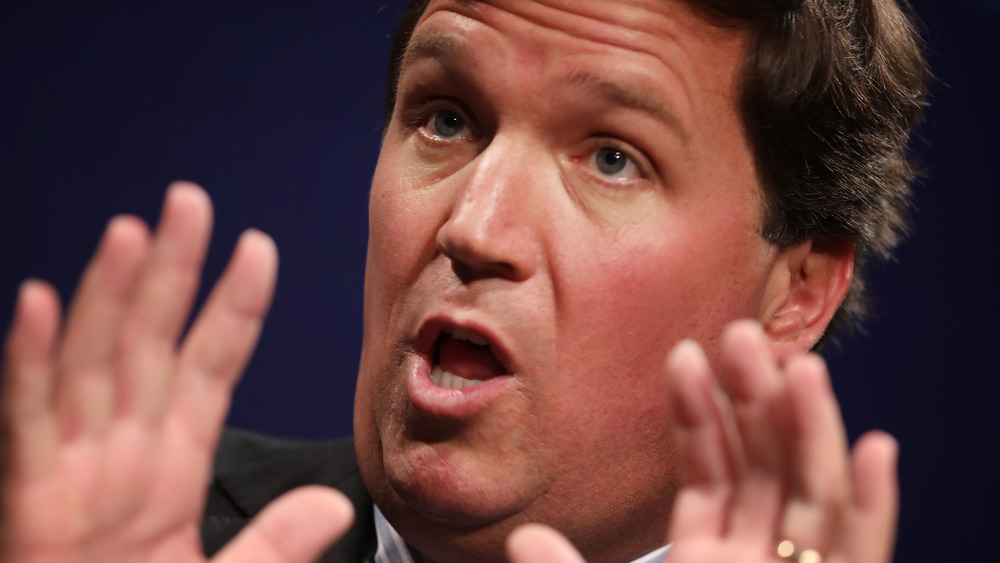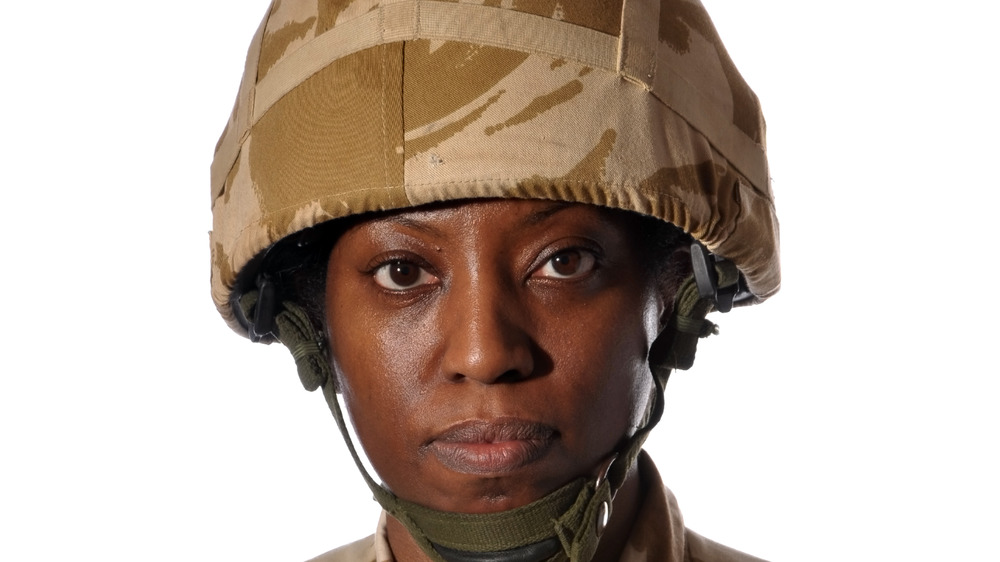Tucker Carlson's Comments Have A Deeper Meaning Than You Thought. Expert Explains
While Tucker Carlson, the face (and voice) of the Fox News network, isn't exactly known for his progressive views, he does see himself as a staunch supporter of certain All-American institutions including the U.S. military. In recent comments he made on a news broadcast, though, he mocked certain changes the military has implemented in order to accommodate its female members. Carlson called out the "new hairstyles and maternity flight suits," citing his fear that "pregnant women are going to fight our wars" and calling it "a mockery of the U.S. military." Well, the Pentagon top brass didn't take kindly to this type of "support," with CNN reporting that military leaders including General Paul Funk, head of Army Training and Doctrine Command, Fort Hood Deputy Commanding General John B. Richardson IV, and the Army's top NCO, Sergeant Major of the Army Michael A. Grinston have all tweeted their disapproval of Carlson's remarks.
Still, what's said cannot be unsaid, and unfortunately Carlson most likely does have a number of supporters. The List spoke with Dr. Shauna 'Doc' Springer, chief psychologist for PTSD treatment center STELLA and an expert on psychological trauma and military transition. While she acknowledges that Carlson "get[s] economically rewarded for saying things that get a strong emotional reaction from viewers" and understands that "when a person with a large platform says something that is disrespectful to a group of people, there's a gravitational pull for others to respond," she warns the response may only worsen the problem.
The best way to respond may be with silence
No matter what Twitter has to say, even top-ranking tweeters like the ones named above, Springer says "we shouldn't look to bullies to apologize — they'll do anything to justify their point of view, especially when there is a financial or attentional reward." Well, Carlson will likely to continue to bring home the big bucks no matter what he does or doesn't say, but as to the attention he receives ... To some extent, this is up to all of us.
Responding, Springer says, "can sometimes deepen and enhance bias by making the comments — or the person who made them — seem more important than they are." She characterizes as a Catch-22 the fact that responding only brings such hurtful comments to a wider audience, and says Carlson's comments are "part of a larger pattern of using the media to engage in bullying, at scale." All we stand to gain from responding in kind is to drain energy away from the ones being attacked (in this case, female service members) since they're forced to go into "defense mode" while the bullies themselves are just rewarded with more of the attention they crave.
How Carlson's remarks relate to the problem faced by women in uniform
Springer says that bullies such as Carlson "put others in a chronic threat response mode" which can contribute to or exacerbate PTSD, something female soldiers are at high risk of. Certain studies of recent veterans (via Elite Learning) have shown that women may be up to 2.5 times more likely to develop PTSD than male veterans, in no small part due to their risk of exposure to what is referred to as "Military Sexual Trauma" (MST). In other words, many women in the armed forces have been or are being harassed or assaulted by their fellow soldiers.
Springer has some words to say about MST, as well. She notes that "military sexual assault does not happen in a vacuum," saying that instead "they happen in the context of larger beliefs that women — and the strengths they bring to the fight — are not assets in a way that is equal to men." While she notes that some women find their military service to be empowering, these women are typically the ones whose male colleagues accept and support them. Female soldiers whose colleagues dismiss or, worse, harass them, may find themselves feeling like "second-class citizens" instead. "Women in the military," says Springer, "need their brothers and sisters in arms to stand with them and help them develop their unique capabilities, not diminish them, bully them, or treat them as less valuable."
What needs to be done to set the record straight
Okay, so we shouldn't all jump on Twitter and start hashtagging #CancelCarlson, since that's probably playing right into his hands. For professional pot-stirrers, after all, there's no such thing as negative attention, and any attempts to "cancel" them tends to have the opposite affect. Springer says "It would be good to get on the same page about how we are going to efficiently respond in a way that does not reward the source of them with attention and financial gain."
Would it be possible, Springer wonders, for the media itself to adopt some sort of code of conduct or at least an agreement to maintain a certain level of respect and civility? She explains what she would like to see is all of the major media outlets coming together to "call it like it is, take a firm, but efficient stance against bullying behavior, and move on the things that are worth attending to." As an example, she suggests that they could respond to comments such as Carlson's by "highlighting examples of female warriors that could drop most men before such men would land the first blow," and offers that she's acquainted with "several people who fit this criterion." Well, that would certainly be something worth seeing on TV, even if these women warriors weren't going mano a mano with Mr. Carlson himself.



